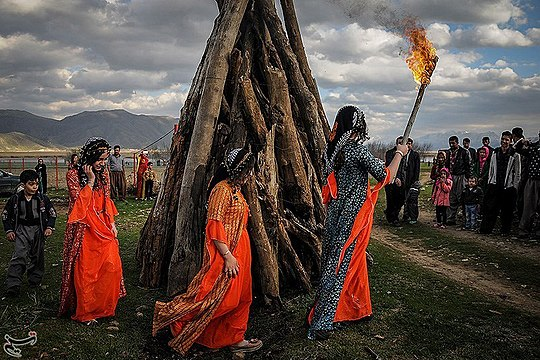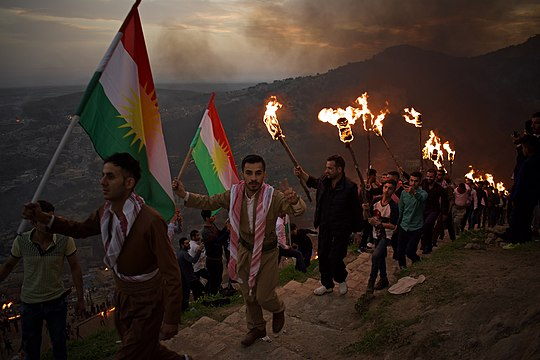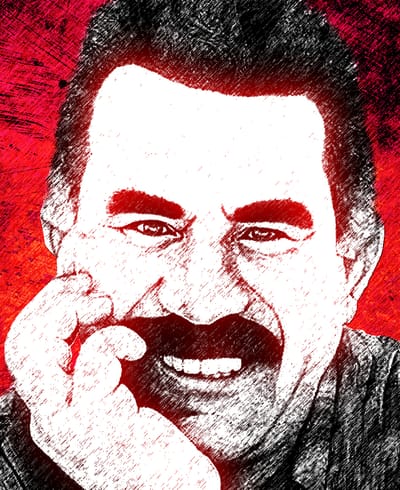about us
Jump to navigationJump to searchAbdullah Öcalan
BornResidenceNationalityCitizenshipEducationOccupationOrganizationSpouse(s)Relatives
Born : 1946–1948 Ömerli, Turkey
Residence : İmralı (prison island)
Nationality : Kurdish/Turkish
Education : Ankara University, Faculty of Political Science
Occupation : Founder and leader of militant organization PKK, political activist, writer, political theorist
Organization : Kurdistan Workers' Party (PKK), Koma Civakên Kurdistan (KCK)
Relatives : Dilek Öcalan (niece) Osman Öcalan (brother) Mehmet Öcalan (brother)
Öcalan was arrested in 1999 by the Turkish National Intelligence Agency (MIT) with the support of the CIA in Nairobi and taken to Turkey, where he was sentenced to death under Article 125 of the Turkish Penal Code, which concerns the formation of armed organisations. The sentence was commuted to aggravated life imprisonment when Turkey abolished the death penalty in support of its bid to be admitted to membership in the European Union. From 1999 until 2009, he was the sole prisoner on İmralıisland, in the Sea of Marmara. Öcalan now argues that the period of armed warfare is past and a political solution to the Kurdish question should be developed. The conflict between Turkey and the PKK has resulted in over 40,000 deaths, including PKK members, the Turkish military, and civilians, both Kurdish and Turkish.
From prison, Öcalan has published several books, the most recent in 2015. Jineology, also known as the science of women, is a form of feminism advocated by Öcalan and subsequently a fundamental tenet of the Apoist movement.
Timeline
Family
Öcalan was born in Ömerli, a village in Halfeti, Şanlıurfa Province in eastern Turkey. While some sources report his birthday as being 4 April 1948, no official birth records for him exist, and he himself claims not to know exactly when he was born, estimating the year to be 1946 or 1947. He is the oldest of seven children. According to some sources, Öcalan's grandmother was an ethnic Turkand (he once claimed that) his mother was also an ethnic Turk. According to Amikam Nachmani, lecturer at the Bar-Ilan Universityin Israel, Öcalan did not know Kurdish when he met him in 1991. Nachmani: "He [Öcalan] told me that he speaks Turkish, gives orders in Turkish, and thinks in Turkish."
Bêtir hîn bibin04/04/1948Education
Education and early political and revolutionary activity After graduating from a vocational high school in Ankara (Turkish: Ankara Tapu-Kadastro Meslek Lisesi), Öcalan started working at the Diyarbakir Title Deeds Office. He was relocated one month later to Bakırköy, Istanbul. Later, he entered the Istanbul Law Faculty but transferred after the first year to Ankara University to study political science. His return to Ankara (normally impossible given his situation) was facilitated by the state in order to divide a militant group, Dev-Genç (Revolutionary Youth Federation of Turkey), of which Öcalan at the time was a member of. President Süleyman Demirel later regretted this decision, since the PKK was to become a much greater threat to the state than Dev-Genç.
Bêtir hîn bibin01/08/1978Kurdish
Kurdish–Turkish conflict Main article: Kurdish–Turkish conflictIn 1984, the PKK initiated a campaign of armed conflict, comprising attacks against government forces in Turkey as well as civilians in order to create an independent Kurdish state. As a result, the United States, European Union, NATO, Syria, Australia, Turkey, and many other countries have included the PKK on their lists of terrorist organizations.
02/04/1984Capture and trial
PKK leader Öcalan allegedly used this Cypriot passport to enter Kenya where he was taken in and protected by the Greek embassy. Öcalan supporters in London, April 2003Until 1998, Öcalan was based in Syria. On at least one occasion, in 1993, he was detained and held by Syria's General Intelligence Directorate but later released. As the situation deteriorated in Turkey, the Turkish government openly threatened Syria over its support for the PKK.As a result, the Syrian government forced Öcalan to leave the country, but did not turn him over to the Turkish authorities.
Bêtir hîn bibin03/14/1998Detention conditions
Since 27 July 2011 his lawyers have not been allowed to see Abdullah Öcalan. There are regular demonstrations held by Kurdish community to raise awareness of the isolation of Öcalan. In October 2012 several hundred Kurdish political prisoners went on hunger strike for better detention conditions for Öcalan and the right to use the Kurdish language in education and jurisprudence. The hunger strike perdured 68 days until Öcalan demanded its end.The lawyers have appealed 700 times for visits, but all were rejected. Öcalan was banned from receiving visits almost two years from 6 October 2014 to the 11 September 2016, when his brother Mehmet Öcalan visited him for Eid al-Adha. Then again he was banned from receiving visits until 12 January 2019 when his brother Mehmet Öcalan was again permitted to visit him. His brother said his health conditions were good.
02/15/1999Legal prosecution
Legal prosecution of sympathizers of Abdullah Öcalan In 2008, the Justice Minister of Turkey, Mehmet Ali Sahin, said that between 2006 and 2007 949 people were convicted and more than 7000 people prosecuted for calling Öcalan "esteemed" (Sayın).
01/06/2006History
Abandoning his precapture policy, which involved violence targeting civilians as well as military personnel, Öcalan has advocated a relatively peaceful solution to the Kurdish conflict inside the borders of Turkey. Öcalan called for the foundation of a "Truth and Justice Commission" by Kurdish institutions in order to investigate war crimes committed by the PKK and Turkish security forces; a parallel structure began functioning in May 2006 In March 2005, Öcalan issued the Declaration of Democratic confederalism in Kurdistan calling for a border-free confederation between the Kurdish regions of Eastern Turkey (called "Northern Kurdistan" by Kurds), East Syria ("Western Kurdistan"), Northern Iraq ("South Kurdistan"), and West of Iran ("East Kurdistan"). In this zone, three bodies of law would be implemented: EU law, Turkish/Syrian/Iraqi/Iranian law and Kurdish law. This perspective was included in the PKK programme following the "Refoundation Congress" in April 2005. Öcalan had his lawyer, Ibrahim Bilmez, release a statement 28 September 2006, calling on the PKK to declare a ceasefire and seek peace with Turkey. Öcalan's statement said, "The PKK should not use weapons unless it is attacked with the aim of annihilation," and that it is "very important to build a democratic union between Turks and Kurds. With this process, the way to democratic dialogue will be also opened".
Bêtir hîn bibin06/10/2005Democratic confederalism
Since his incarceration, Öcalan has significantly changed his ideology through exposure to Western social theorists such as Murray Bookchin, Immanuel Wallerstein, Fernand Braudel, and Friedrich Nietzsche (who Öcalan calls "a prophet") Drawing heavily on Bookchin's libertarian socialist idea of communalism, Öcalan fashioned his ideal society of "democratic confederalism". He also wrote books and articles on the history of pre-capitalist Mesopotamia and Abrahamic religions. Democratic confederalism is a "system of popularly elected administrative councils, allowing local communities to exercise autonomous control over their assets, while linking to other communities via a network of confederal councils."Decisions are made by communes in each neighborhood, village, or city. All are welcome to partake in the communal councils, but political participation is not mandated. There is no private property, but rather “ownership by use, which grants individuals usage rights to the buildings, land, and infrastructure, but not the right to sell and buy on the market or convert them private enterprises.” The economy is in the hands of the communal councils, and is thus (in the words of Bookchin) ‘neither collectivised nor privatised, it is common.’
Bêtir hîn bibin05/15/1999Honorary citizenships
Several localities have awarded him with an honorary citizenship: • Palermo • Olympia • Neapel • Castel del Giudice • Castelbottaccio • Pinerolo • Martano • Reggio Emilia • Palagonia • Riace
06/09/1991Publications
Öcalan is the author of more than 40 books, four of which were written in prison. Many of the notes taken from his weekly meetings with his lawyers have been edited and published. • Interviews and Speeches. London: Kurdistan Solidarity Committee; Kurdistan Information Centre, 1991. 46 p. • Translation of his 1999 defense in court at the Wayback Machine (archived 20 October 2007) • Prison Writings: The Roots of Civilisation London; Ann Arbor, MI: Pluto, 2007. ISBN 9780745326160. • Democratic Confederalism. London: Transmedia, 2011. ISBN 978-3941012479. • Prison Writings III: The Road Map to Negotiations. Cologne: International Initiative, 2012. ISBN 9783941012431. • Liberating life: Women’s Revolution. Cologne, Germany: International Initiative Edition, 2013. ISBN 978-3-941012-82-0. • Manifesto for a Democratic Civilization, Volume 1. Porsgrunn, Norway: New Compass, 2015. ISBN 9788293064428. • Defending a Civilisation. • The Political Thought of Abdullah Öcalan London; UK: Pluto Press, 2017. ISBN 9780745399768. • Prison Writings Volume II: The PKK and the Kurdish Question in the 21st Century. London: Transmedia, 2011. ISBN 9780956751409.
Bêtir hîn bibin05/06/1991References
"Profile: Abdullah Ocalan ( Greyer and tempered by long isolation, PKK leader is braving the scepticism of many Turks, and some of his own fighters)". www.aljazeera.com. ^ R. McHugh, ‘Ocalan, Abdullah (1948—) ^ Özcan, Ali Kemal. Turkey's Kurds: A Theoretical Analysis of the PKK and Abdullah Öcalan. London: Routledge, 2005.
Bêtir hîn bibin11/30/1982Effects
Books
Books by Abdullah Öcalan in English
Collection of books : Challenging Capitalist Modernity II -The Political Thought of Abdullah Öcalan - Capitalism - Manifesto for a Democratic Civilization Volume I: Civilization - Challenging Capitalist Modernity - The Road Map to Negotiations - The PKK and the Kurdish Question in the 21st Century - The Roots of Civilisation - Declaration on the Democratic Solution of the Kurdish Question - Democratic Nation - Liberating Life: Woman's Revolution - Democratic Confederalism - War and Peace in Kurdistan - The Third Domain &...
Newroz
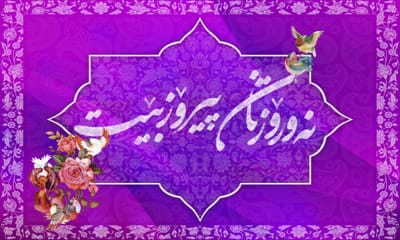
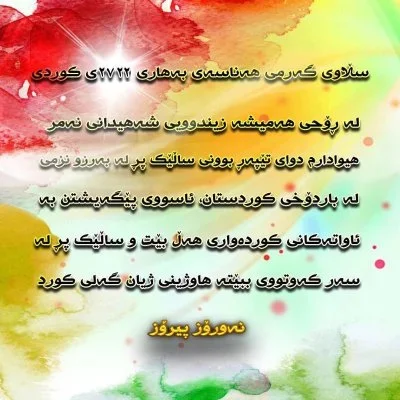
نوروز یا نوروز (کردی: نهورهز / Newroz / Nawroz، also: Gulus کرد: گوڵوس) جشن تعطیلات نوروز سنتی مردم سال نو نوروز در فرهنگ کردی است. پیش از اسلامی شدن اقوام ایرانی در آسیا ، اجداد کردهای مدرن پیرو آیین زرتشت بودند. در آموزه زرتشتی ، آتش نمادی از بینایی ، نیکی و تطهیر است. Angra Mainyu ، ضد شیطان ضد زرتشت ، هر سال توسط زرتشتیان با آتش بزرگی سرپیچی می شد ، که سمبل مقاومت و نفرت آنها از شر و شر طاعون بود. در افسانه کردی ، این تعطیلات جشن رهایی کردها از یک ستمگر است و به عنوان راه دیگری برای نشان دادن حمایت از آرمان کردها دیده می شود. این جشن همزمان با اعتدال مارس است که معمولاً در 21 مارس می افتد و معمولاً بین 18 تا 24 مارس برگزار می شود. این جشنواره از نظر هویت کرد برای اکثر کردها ، اکثراً در عراق ، ترکیه و سوریه از اهمیت ویژه ای برخوردار است. اگرچه جشن ها متفاوت است ، مردم به طور کلی برای استقبال از آمدن بهار گرد هم می آیند. آنها لباس های رنگی می پوشند و با هم می رقصند.
فهرست
- 1 اساطیر
- 2 آداب و رسوم جدید و جشن
- 3 خط مشی سیاسی
- 4Newroz در ادبیات کردی
- 5 همچنین ببینید
- 6 گالری
- 7 رفرنس
- 8 پیوندهای خارجی
ورود بهار از زمان نوسنگی در آسیای صغیر جشن گرفته شده است. ریشه این داستان به افسانه های ایران باستان برمی گردد ، که در تاریخ عمومی توسط دانشمند کُرد دیناواری ، بازگو شده از چمنزارهای طلا توسط مورخ مسلمان مسعودی ، شاهنامه ، یک اپوس شاعرانه توسط شاعر فارسی فردوسی در حدود هزار سال میلادی ، و شرفنامه توسط مورخ کرد قرون وسطایی ، شفرفان بیدلیسی.
ضحاک که توسط کردها به او زهک گفته می شود ، یک پادشاه شرور آشوری بود که ایران را فتح کرد و مارها از شانه هایش در حال رشد بود. حکومت ضحاک یک هزار سال به طول انجامید. سلطنت شر او باعث شد که بهار دیگر به کردستان نیاید. در این مدت روزانه دو جوان قربانی می شدند و مغز آنها برای تسکین درد او به مارهای ضحاک ارائه می شد. با این حال ، مردی که وظیفه قربانی کردن این دو جوان را داشت ، در عوض روزانه فقط یک مرد را می کشد و مغز خود را با گوسفندان مخلوط می کند تا مرد دیگری را نجات دهد. با نارضایتی علیه حکومت ضحاک ، نجیب فریدون طغیان برنامه ریزی کرد. این قیام به رهبری کاوه (که به نام کاوا نیز شناخته می شود) (به زبان اوستیایی ، کردالاگون) ، یک آهنگر بود که شش فرزند خود را به ضحاک از دست داده بود. مردهای جوانی که از سرنوشت قربانی شدن نجات یافته بودند (که طبق افسانه اجداد کردها بودند) توسط کاوه به ارتش آموزش داده شدند که به قلعه ضحاک راهپیمایی کردند و در آنجا کاوه با چکش پادشاه را کشت. گفته می شود كه کاوه برای جشن پیروزی و احضار هواداران خود ، تپه ها را به آتش كشیده است. روز بهار به کردستان بازگشت.
20 مارس به طور سنتی به عنوان روزی است که کاوه ضحاک را شکست. این افسانه اکنون توسط کردها استفاده می شود تا به خودشان یادآوری کنند که آنها مردمی متفاوت ، قوی هستند و از آن زمان روشن شدن آتش سوزی به سمبل آزادی تبدیل شده است. این یک سنت است که در جشن های نوروز به آتش بپردازید.
به گفته Evliya ebelebi ، منطقه (تحریم) Merkawe در شهرازور در بخش جنوب شرقی کردستان عراق با نام کاوه نامگذاری شده است. جغرافیدان قرن دوازدهم یاقوت هماوی از زور (زور) فرزند زهاک (آجی دهاک) به عنوان بنیانگذار شهر معروف شارازور یاد می کند.
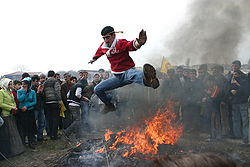
این یک سنت است که در جشن های نوروز به آتش بپردازید.
در دهه 1930 ، شاعر کرد ، طوفیک عبدالله ، خواستار القای احیای فرهنگی جدید کردی ، از نسخه ای که قبلاً شناخته شده و اصلاح شده از داستان کاوا بود استفاده کرد. او اسطوره هایی را که مردم در آنها از نوروز مظلوم بودند ، به هم پیوند داد ، بنابراین یک تعطیلات در حال مرگ را زنده کرد و آن را به سمبل مبارزه ملی کرد تبدیل کرد. با این وجود ، لازم به ذکر است که کردها مدتها قبل از این جشن ، جشن نوروز را جشن می گرفتند و کلمه "Newroz" در شعرهای کرد از قرن شانزدهم ذکر شده است.
آداب و رسوم و جشن های نوروز مهمترین جشنواره در فرهنگ کردی به حساب می آید و زمانی برای سرگرمی از جمله بازی ها ، رقصیدن ، اجتماعات خانوادگی ، تهیه غذاهای ویژه و خواندن شعر است. جشن نوروز ویژگی های محلی خود را در مناطق مختلف کردستان دارد. در آستانه نوروز ، در جنوب و شرق کردستان ، آتش سوزی روشن می شود. این آتش سوزی ها نمادی از گذشت فصل تاریک ، زمستان و رسیدن بهار ، فصل نور است. احمدخانی ، شاعر کرد قرن هفدهم ، در یکی از اشعار خود ذکر می کند که چگونه مردم ، جوانان و افراد مسن ، خانه های خود را ترك می كنند و برای جشن گرفتن نوروز در حومه شهر جمع می شوند.
غلبه سیاسی بر
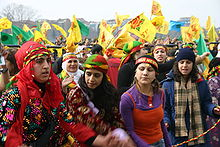
Newroz در استانبول
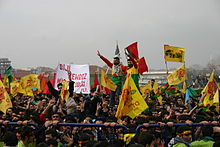
Newroz در استانبول
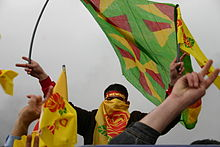
Newroz در استانبول
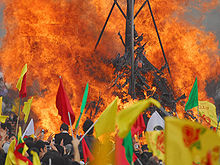
Newroz در دیاربکر
ارتباط کردها با نوروز از دهه 1950 به طور فزاینده ای مورد توجه قرار گرفت که کردها در خاورمیانه و کسانی که در اروپا بودند ، آن را به عنوان یک سنت به کار گرفتند. پس از آزار و اذیت کردهای ترکیه ، احیای جشن نوروز شدیدتر و سیاسی تر شده و همچنین به سمبل رستاخیز کردها تبدیل شده است. در اواخر دهه 80 ، نوروز عمدتاً با تلاش برای ابراز و احیای هویت کردی همراه بود.
در حالی که جشن کردها در ترکیه به شکل یک بیان سیاسی در آمده است ، بیشتر جشن های کردی در ایران با جشنواره های ملی یکسان است. مردم شناس مهرداد آر ایزدی اظهار می دارد که دلیل این امر ممکن است این باشد که سنت اصلی و فرهنگ عامه در پشت نوروز در مناطق شمالی و غربی کردستان از بین رفته است ، جایی که هرگز به همان شکلی که در قسمت های جنوبی و شرقی رخ داده است تکامل نیافته است. ایزدی در ادامه اظهار می دارد که شاید به دلیل برجستگی قاطع ترین پیروان آن - کردها در مناطق کردستان عراق و ایران - به تازگی به تازگی مطبوعاتی بهتر شده و به دلیل برجستگی قاطعانه پیروان خود ، از کردها در مناطق کردستان عراق و ایران لذت ببرند. بنابراین به نظر می رسد کردهای غربی و شمالی جشن سال نو را به عنوان یک بیان سیاسی وحدت آور تلقی می کنند.
در سال 2000 ، ترکیه جشن تعطیلات بهاری را قانونی کرد و آن را "Nevruz" هجی کرد و آن را به عنوان تعطیلات بهاری ترکیه ادعا کرد. استفاده از املاء کردی "Newroz" به طور رسمی ممنوع است ، اگرچه هنوز هم توسط کردها بسیار مورد استفاده قرار می گیرد. در مناطق کردنشین ترکیه ، به ویژه در آناتولیابوت شرقی همچنین در استانبول و آنکارا که جمعیت زیادی از کردها وجود دارد ، مردم جمع می شوند و از آتش سوزی پرش می کنند. پیش از آن كه قانونی شود ، پ.ك.ك ، حزب كارگران كردستان ، تاریخ جشنواره نوروز را برای انجام حملات برای به دست آوردن تبلیغات برای هدف خود انتخاب كرده بودند. این امر باعث شد نیروهای ترکیه هزاران نفر را که به عنوان حامی جنبش های شورشی کرد به نظر می رسند ، بازداشت کند. در جشن های نوروز سال 1992 ، بیش از 90 شرکت کننده کرد توسط دولت ترکیه کشته شدند. در سال 2008،
در سوریه کردها با لباس ملی خود لباس می پوشند و سال جدید را جشن می گیرند. به گفته دیده بان حقوق بشر ، کردهای سوریه مجبور شده اند برای جشن گرفتن نوروز به مبارزه بپردازند و در گذشته این جشن به ظلم و ستم شدید منجر شده و منجر به کشته شدن و دستگیری های گسترده شده است. دولت اظهار داشته است که جشن های نوروز تا زمانی که تبدیل به تظاهرات سیاسی برای رفتار با کردها نشوند تحمل می شود. در طول جشن های نوروز در سال 2008 ، سه کرد در اثر نیروهای امنیتی سوریه کشته شدند.
کردهای موجود در دیارپورا سال جدید را نیز جشن می گیرند: کردها در استرالیا جشن نوروز را نه تنها به عنوان آغاز سال جدید بلکه به عنوان روز ملی کردها. کردها در فنلاند سال جدید را به عنوان راهی برای نشان دادن حمایت خود از آرمان کردی جشن می گیرند. در لندن ، سازمان دهندگان تخمین می زنند که 25000 نفر در ماه مارس سال 2006 میلادی را جشن می گیرند.
در آثار بسیاری از شاعران و نویسندگان کرد و همچنین موسیقیدانان از نوآموزان در ادبیات کردی یاد شده است. یكی از اولین ركورد های جدید در ادبیات كردستان مربوط به Melayê Cizîrî (1640-1570) است.
بدون نور و آتش عشق ، بدون طراح و قدرت خالق ، ما قادر به رسیدن به اتحادیه نیستیم. (نور برای ماست و تاریکی شب است) این آتش سوزی و شستشوی قلب ، قلب من را پس از آن ادعا می کند پیرامرد نویسنده و شاعر مشهور کرد (1967- 1867) در شعرهای خود در سال 1948 می نویسد: "Newroz" و سال نو.
روز سال نو امروز است. Newroz بازگشت.در جشنواره کردستان باستان ، با نشاط و قوت و شوق. برای سالها ، گل آرزوهامان رو به زوال بود. خشخاش بهار خون جوانان بود.این رنگ قرمز در افق بلند کرد بود که بشارت می داد. سپیده دم به ملل از راه دور و نزدیک آن روز نوآوری بود که قلبها را با چنین آتشی آغشته کرده بود و همین باعث شد جوانان با عشق فداکارانه مرگ را دریافت کنند! خورشید از کوههای مرتفع میهن می درخشد. این خون شهدای ماست که این افق نشان می دهد هرگز در تاریخ هیچ ملتی اتفاق نیفتاده است. ارزش ندارد که برای شهدای میهن گریه و عزاداری کنید. آنها نمی میرند. آنها در قلب ملت زندگی می کنند.
